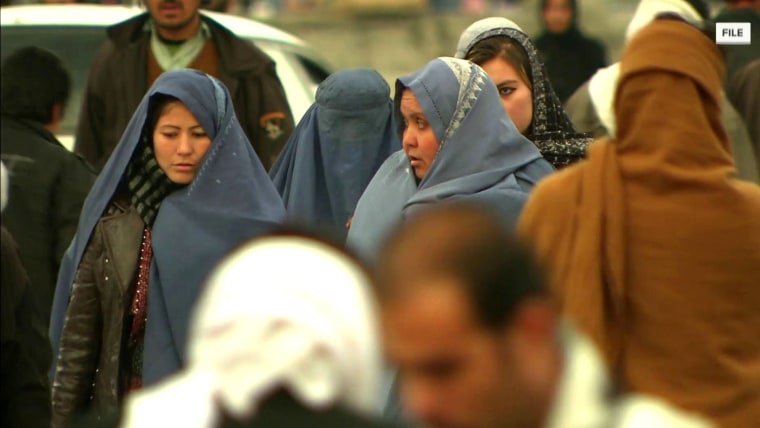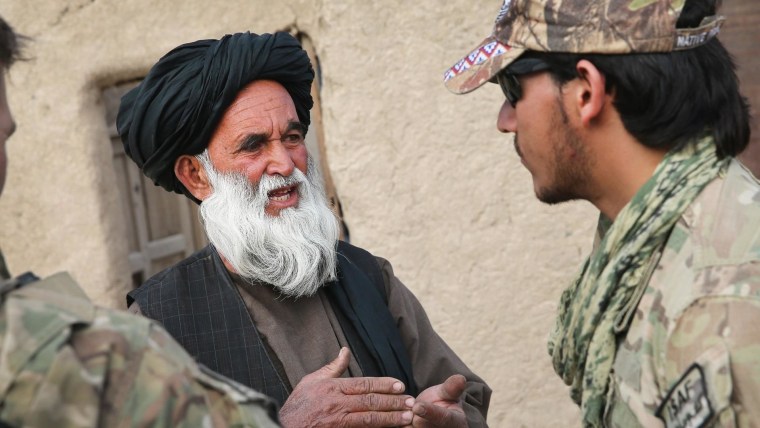WASHINGTON — The Pentagon and the State Department are drawing up plans for the possible evacuation of Afghans whose lives are in danger due to their work for the U.S. government, according to the U.S. military’s top officer.
Gen. Mark Milley, chairman of the Joint Chiefs of Staff, said it was clear that a “significant” number of Afghans who worked as interpreters or in other roles for the American military or embassy now face potential retribution by the Taliban.
“Their safety could be at risk. And we recognize that that’s a very important task is to ensure that we remain faithful to them, and that we do what’s necessary to ensure their protection and, if necessary, get them out of the country if that’s what they want to do,” Milley told reporters aboard his plane after delivering a commencement address Wednesday at the U.S. Air Force Academy in Colorado.
The State Department was the lead agency overseeing the issue, Milley said in remarks that were released by his office on Thursday.
“There are plans being developed very, very rapidly here, not just interpreters but a lot of other people that have worked with the United States,” he said.
The general’s remarks marked the first time any senior figure in the administration has confirmed publicly that a possible evacuation was under consideration or that contingency planning for an evacuation was under way.
Milley’s comments were first reported by Defense One.
The State Department did not immediately respond to requests for comment.
In a statement, a spokesperson for the National Security Council said, “I refer you to the Joint Staff to characterize Gen. Milley’s comments. I can tell you we have no plans for evacuations at this time. The State Department is processing SIV applications in Kabul. They are focused on ensuring that the system functions quickly and consistent with U.S. security and other application requirements.”
U.S. officials previously have acknowledged the danger facing many former Afghan interpreters but have indicated that the administration wanted to avoid triggering panic or sending a signal that Washington had lost faith in the Afghan government’s ability to survive.
“We don’t want to signal panic and the departure of all educated Afghans by worst-casing and undermining the morale of the Afghan security forces,” the U.S. special envoy for Afghanistan reconciliation, Zalmay Khalilzad, told lawmakers at a May 18 hearing.
“So this is a delicate, complicated balance that we have to keep,” said Khalilzad, who negotiated a U.S. troop withdrawal deal with the Taliban.
Rep. Mike Waltz, a Republican from Florida and an outspoken advocate of evacuating Afghan partners, said he was encouraged by Gen. Milley’s remarks but appealed for faster action as U.S. troops would soon be out of the country.
“While I welcome these comments, we need to see action sooner rather than later,” Waltz said in an email. “We need to show the world we reward those who help us against the enemy rather than leave them behind.
U.S. officials testifying before Congress or answering reporters’ questions previously have emphasized efforts to expand and speed up efforts to provide visas to the roughly 17,000 to 18,000 Afghans who have applied under a program for former employees of the U.S. military or embassy in Kabul. The program has been bogged down in delays with applicants waiting for years.
A federal court ruled in 2019 that the U.S. government had failed to abide by a law requiring it to process applications within nine months, and an inspector general’s report last year described a chronic staffing shortage that had hobbled the program.
Citing assassinations of Afghans associated with the U.S. or Western governments, a growing number of lawmakers from both parties as well as veterans and refugee rights groups are urging the Biden administration to organize an evacuation to a U.S. territory or military base outside of Afghanistan where the visa applicants’ paperwork would be vetted and reviewed.
Advocates of the idea cite the U.S. military evacuation of about 6,600 Iraqi Kurds to the U.S. territory of Guam in 1996 and 1997. The move came after Saddam Hussein’s regime launched attacks into Iraq’s Kurdish region. The Kurds were housed at Andersen Air Force Base for three to four months and most eventually resettled in the United States.
Asked on Thursday about a possible airlift of endangered Afghan partners, Milley said, “That is a way of doing it.”
He added: “I’m not going to discuss how we’re going to do it because that’ll be in the future. I typically don’t discuss things happening in the future. But we have the capabilities to execute this for those that want to do it.”
As for future U.S. relations with Afghanistan after American troops leave by Sept. 11, Milley said the United States would maintain an embassy in the country, keep up financial support to the Afghan military and track terrorist threats from afar.
“We want to keep money flowing to the Afghan government security forces,” he said. “We’re going to provide them with assistance from over the horizon, outside of the country. And we want to maintain appropriate levels of surveillance, reconnaissance, early warning indicators of any reconstituting terrorist threat, so we can take appropriate measures if necessary.”
Source: | This article originally belongs to Nbcnews.com













